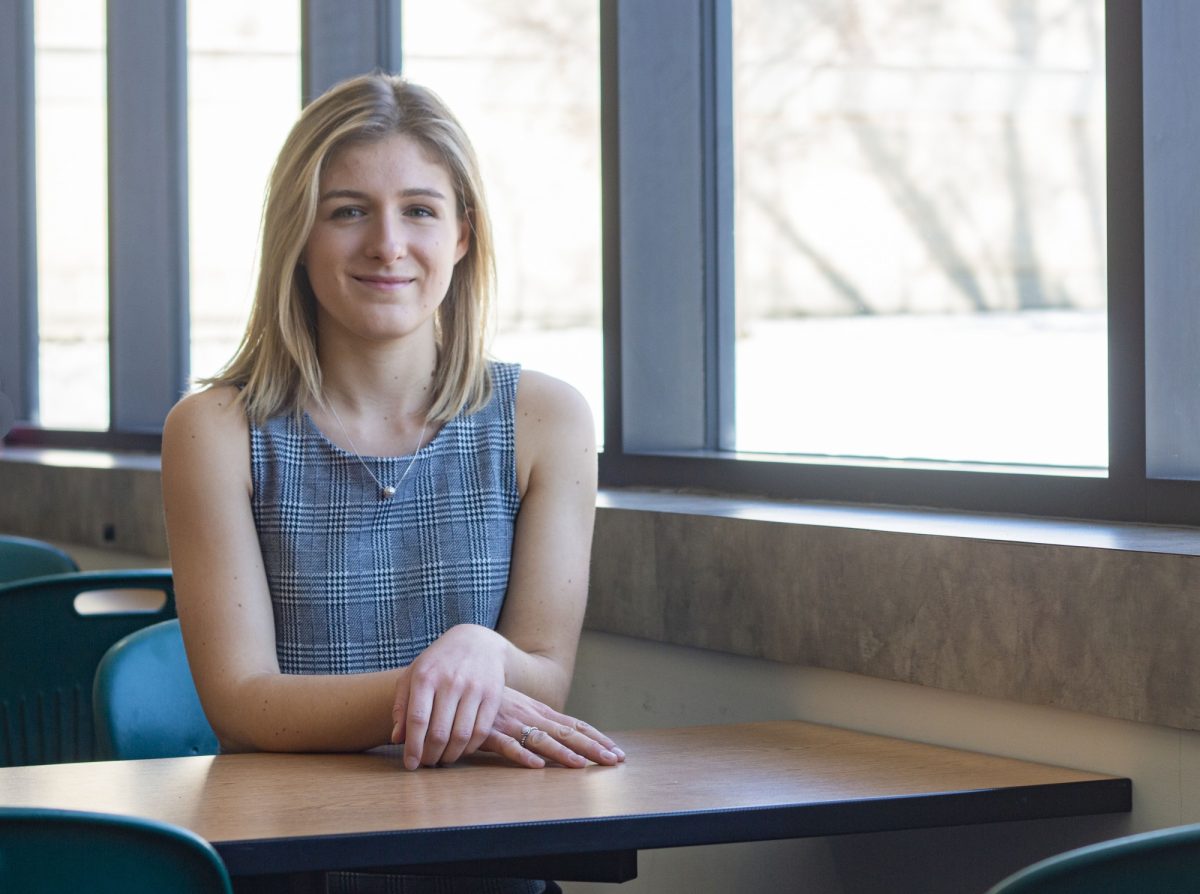
Sasha Kullman // Photo by Garrick Kozier
Poster competition winner relishes research experience
Sasha Kullman started the morning of Thursday, Oct. 24 just like any other. She ate breakfast, scrolled through her feeds, and headed out for another day of school at the University of Manitoba.
The only deviation from the norm was that there was an undergraduate research poster competition happening later in the afternoon. And she was competing in it.
The third-year kinesiology student, alongside 140 other learners (a vast majority of them Undergraduate Research Award recipients, just like Kullman) had the opportunity to explain their research to a hive collective of judges. Up for grabs: a place on a podium and a new entry in the Awards and Honours section of their curricula vitae.
It’s really an exposing process; having virtual strangers scrutinize and analyze aspects of your research, similar to how a jeweller inspects the angular ridges of a crumb-sized diamond.
“I’m use to it,” said Kullman, 20. She was fresh off presenting the same poster at a conference in Vancouver the weekend prior.
The practice paid off. Kullman won first place overall in the social sciences/humanities category of the URA poster competition.
This interview was condensed and edited for clarity, and was conducted in the Active Living Centre Agora on Tuesday, Nov. 12.
Take us back to the award announcement. How did you feel when you heard your name and that you had just won first place in your category?
I was shocked. I could feel my heart pounding in my chest. I was just giddy. Really, I entered my poster into the competition for the experience. I didn’t expect to win anything out of it.
Have you won first place at anything else before?
Other than getting an Undergraduate Research Award and scholarships in the past, no. Nothing like this.
Now that you’re URA famous, how has your life changed?
I don’t know [she laughs]. A lot of the profs said ‘congratulations’ to me in the hallways and that’s been very nice. It’s just been a good way to get my name out in our faculty to get to know some new people. It’s also sparked some interest with other students. I’ve been asked about the interesting application process quite a bit.
Interesting how?
You need to find two professors you’d like to conduct research with and interview them. It’s interesting because you interview them—instead of the other way around. I’ve never had that kind of experience before. Usually when I’m applying for a job, someone else is interviewing me.
How did you hear about the URA and why did you apply?
I saw an advertisement for it in the hallway. I saw it as a good way to add to my résumé, and I was interested in seeing whether or not I’d like research. And it turns out I really do like research. The whole thing was great.
So how did you spend your undergraduate research summer?
The first couple weeks introduced me to the study I’d be working on, so I did a lot of reading and literature reviews in the area of self-compassion. I learned how to apply for grants. I spent time recruiting participants for other studies. And I did a systematic review of 21,000 abstracts. I’m actually still working on that.
21,000? My goodness.
I actually really like it. It’s therapeutic.
What was the main study about, the one you won your award for?
Here’s a scenario: Let’s say Jennifer is a woman who believes that being an exerciser means working out five-times-a-week. This is her exercise identity. Jennifer has a baby, and now things are obviously much busier. She can exercise maybe twice a week now—if she’s lucky. She feels bad because of this.
We hypothesized that mothers who are more compassionate might be able to adapt their exercise identity and declare that being an exerciser means working out twice a week and they can accept that and maintain at least some exercise behaviour rather than giving up all together.
We found that mothers who are more self-compassionate felt better with their new exercise habits and felt less guilty about exercising less. They were able to adapt their identity and maintain their exercise behaviour after having children.
You explained that very well.
I’ve had a lot of practice.
Did you ever think you’d be doing this kind of research at the undergrad level?
No I didn’t. And I didn’t know that I would love research as much as I did.
What advice do you have for people interested in applying for the Undergraduate Research Award?
Give yourself enough time to apply, and give yourself enough time to read the professors’ bios and think about what you’re interested in. Don’t be afraid to explore something that you’re not familiar with. I definitely was not familiar with exercise psychology—but I ended up loving it. Take a chance. You never know until you get there.
The URA provides an exciting opportunity for students with a thirst for knowledge and aspirations of research experience to spend 16 weeks immersed in their field of interest. It’s also coupled with a $7,000 monetary award.
The Office of the Vice-President, Research and International, in partnership with the University of Manitoba Student Union (UMSU) offers this exciting opportunity for up to 172 students. Ten awards will be dedicated to Indigenous students and two awards dedicated for community-based research projects.
For more information, visit the website. The application deadline is Jan. 24, 2020.






